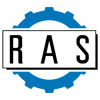In the realm of sheet metal folding, there are two types of manually processed equipment that can help you make this happen: CNC Folding Machines and Press Brakes.
Sheet metal fabrication is a massive industry, but if you’re going to make a profit you need to make sure that you’re cutting, and bending your sheet metal efficiently and effectively. Variations in speed, cost-efficiency, and accuracy could cost your business dearly.
In the realm of sheet metal folding, there are two types of manual process equipment that can help you make this happen: CNC Folding Machines and Press Brakes. CNC folding machines offer solutions press brakes can’t, but why is this the case?
The Differences Between CNC Folding Machines and Press Brakes
The similarity between folding machines and press brakes is that both are used to bend sheet metal. Press brakes have a punch on the top area, with a V-shaped die on the bottom. The tooling must be set up or aligned to provide a quality part
CNC folding machines, by contrast, have pre-aligned upper beam and lower beam tools, minimizing tool set-up time and allowing the fabricator to change from part to part very quickly. In todays pressures of small lot sizes and large volume this is one of the big advantages of folding.
Another advantage is part handling. Larger parts can be manipulated on the gauging eliminating the need for multiple operators and increasing part accuracies.
The Advantages of CNC Folding Machines
Automated folding machines hold a few key advantages over operator involved press brakes:
Machine accuracy. Because folding machines are clamping and bending the part and the part is laying flat on the gauging table and the flange is being bent, there is substantial gain in accuracies vs. the operator needing to manage the part during the forming process.
Manpower and operating needs. Larger parts that require two operators typically can be manipulated by one operator on a Folder because the bulk of the part is resting on the table and the operator can rotate it by themselves. The CNC control will prompt the operator as to how to position the part.
Shorter setup time. Press brakes can require extensive set-up time and additional process knowledge. Folding technology is made relatively easy with precision tooling and CNC Control technology that will check for bending collisions and select bend sequences shrinking the actual set up time and provide more run time.
Sensitive Materials and Cosmetic Parts. The clamping and bending process combined with the axis’ being servo positioned allows the elimination, or at least minimizes, visible bend lines that occur when using a conventional Press Brake and Tooling.
That said, press brakes and similar types of equipment still have a few strengths of their own. They’re quite versatile, capable of a wide range of different jobs, and have enough power to bend very thick sheets of metal. The combination of a Folder and a Press Brake will provide the best solution for bending metal. They actually compliment each other.
Are you interested in learning more about RAS equipment? Check out our selection of folding machines to see our capabilities, or request a quote today!
Founded in 1939, RAS Systems builds metal bending, cutting, and forming equipment, and expert software, and are known for high quality, reliability, and precision. Connect with the RAS Systems team here!
